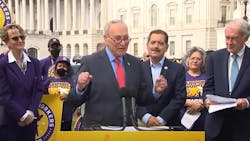Markey, Garcia Introduce Good Jobs for Good Airports
The Good Jobs for Good Airports Act “would require major airports to pay their service workers a living wage and benefits in order to access $11 billion in funds that the federal government provides to airports every single year. Airports also will be required to ensure that vendors like retail stores and restaurants abide by these labor standards.” U.S. Sen. Edward Markey, D-Massachusetts, along with Congressman Jesús G. “Chuy” Garcia, a Democrat from Illinois, introduced the bill during a June 16 press conference outside the Capitol.
Markey described the bill as “common sense proposal” and pointed to the Davis-Bacon Act, which in order to have access to federal funds, requires contractors and subcontractors to pay construction workers and mechanics a living wage and benefits.
“The Good Jobs for Good Airports Act simply extends this condition to apply to airport service workers as well,” he said.
Markey said for first time in over 20 years, employers need workers more than workers need employers.
“This dynamic is especially true for service workers in industries like food and hospitality,” he continued. “Service workers are the unsung heroes of the economy, underappreciated, underpaid and overworked.”
Airport service workers include security officers, baggage handlers, food service workers, wheelchair attendants, cleaning professionals and are disproportionally people of color, he said.
“Studies show that paying airport service workers a living wage and providing them with benefits makes our airports safer by lowering turnover and ensuring that our airports have experienced workforce,” Markey said.
Senate Majority Leader Chuck Schumer said he’s proud to support the Good Jobs for Good Airports Act, which he said says something very simple: “If major airports want access to billions in federal funds, they should make sure airport service workers, including contractors, receive a living wage. Don’t take those federal dollars unless the workers are going to benefit.”
Schumer continued: “Every single day, airport workers make it possible for over a million Americans to travel by air. They handle our bags and staff the concessions and the kitchens and clean the place up and provide security to make sure Americans can get from Point A to Point B without a hitch. … It’s tough work. Very tough work. They don’t mind doing it, but they want to be paid fairly in terms of wages and benefits and healthcare and all of the other things that workers in America deserve.
“We’ve learned how important this legislation is because of what we’ve gone through with COVID. When the COVID pandemic started, airports and the travel industry were among the hardest hit, but deep in the midst of the worst public health crisis in generations, airport workers did their duty. They continued to show up, they continued to keep operations rolling, risking their own health for our safety, for our ability to travel.”
He said their dedication allowed healthcare workers to fly to areas where they were most needed and essential supplies like PPE were delivered.
Those same workers today demand higher wages, quality healthcare, paid time off, the right to join a union, Schumer said, adding, “They deserve all of these things and more.”
“We’re here to say paying those crappy wages for such important jobs, when there’s so much federal money going into our airports, that won’t fly any longer,” Schumer said.
Garcia specified, “There should be basic requirements that ensure that all service workers get at least $15 an hour and a minimum package of benefits. Anything less should be non-negotiable.”
Chicago serves as an example of how this will work, he said. “Thanks to the organizing by unions like SEIU Local 1,” Garcia said, “we passed several provisions to make sure that airport service workers at O’Hare and Midway airports have good wages and benefits and could join a union.”
Connecticut U.S. Sen. Richard Blumenthal said the legislation, which is “the right thing to do,” has a long list of co-sponsors. “It’s an idea whose time has come: Good Jobs for Good Airports,” he said. “You can’t have good airports if you don’t have good jobs.”
Service Employees International Union (SEIU) President Mary Kay Henry said, “What’s useful about this legislation is what Majority Leader Schumer said, which is government is deciding to hold corporations accountable for the taxpayer dollars that are going to our nation’s airports and insisting that poverty wage work cannot exist when the federal government is involved.’”
In the 1970s, these jobs were done by white workers who were directly employed by the airlines, she said. “When (President) Ronald Reagan busted PATCO (Professional Air Traffic Controllers Organization), the airlines decided this was their shot,” Henry said. “And they contracted out a million jobs that were middle class jobs with good wages and benefits and pensions to minimum wage jobs with no guaranteed hours, no benefits.”
U.S. Rep. Eleanor Holmes Norton, D-D.C., a member of the Subcommittee on Aviation, said, “Airport workers are more likely to be people of color and immigrants. Unfair wages increase the racial wage gap and further disadvantage people of color. Fair wages and benefits for airport workers are a racial justice issue also. Establishing minimum wages and benefits for workers at airports across the country encourages equitable treatment of workers and stabilizes workplace conditions for the workers who support our nation’s airports. Providing living wages and benefits is not only good for workers but improves the functioning of airports themselves. Increasing wages and benefits decreases worker turnover, decreases hiring-related costs and promotes healthier workplaces. Promoting worker welfare keeps our airports working.”
Good Jobs for Good Airports At a Glance
Good Jobs for Good Airports would:
- Prevent small, medium and large hub airports from accessing federal funds unless airport service workers are paid the prevailing wage and benefits as established by the Department of Labor.
- Require airports to ensure that service workers employed by vendors (such as restaurants and retail stores) are paid the prevailing wage and benefits.
- Apply to $11 billion in airport funding each year, including $3.2 billion in Airport Improvement Program grants, $3.5 billion airports receive from passenger facility charges, and $4 billion in funds under the bipartisan infrastructure law.
What is a Prevailing Wage?
The prevailing wage rate is defined as the average wage paid to similarly employed workers in a specific occupation in the area of intended employment. Effective January 4, 2010, employers can obtain this wage rate by submitting a request to the National Prevailing Wage Center (NPWC), or by accessing other legitimate sources of information such as the Online Wage Library (OWL), available for use in some programs.
Source: U.S. Department of Labor
About the Author
Rebecca Kanable
Assistant Editor
Rebecca Kanable, a veteran journalist, worked with Endeavor Business Media's aviation group from 2021 to 2024 as assistant editor of Airport Business, AMT and Ground Support Worldwide. She previously worked for various publications, including trade magazines and newspapers.

